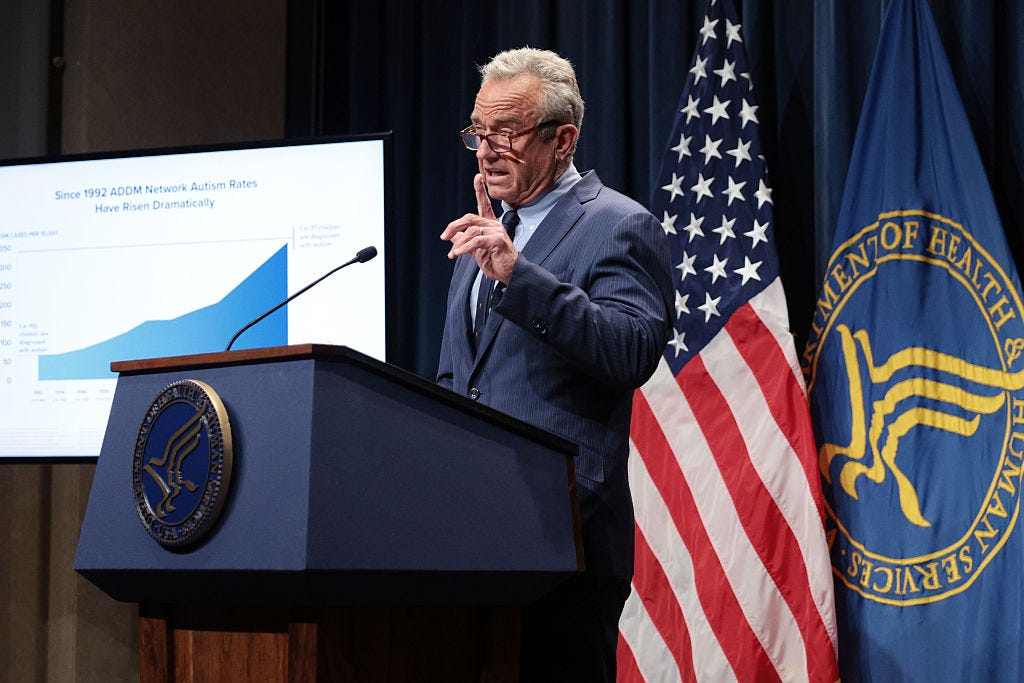The real story on autism
What RFK Jr.'s conspiracy-driven quest to find a "cause" for autism misses, and expert Simon Baron-Cohen on what autistic people actually contribute to, shape, and need from society
This past week, as part of his evisceration of the Department of Health and Human Services, Robert F. Kennedy, Jr. turned his attention to a lifelong goal — establishing the imagined link between vaccines and autism that took hold after the publication of the since-debunked work of Andrew Wakefield. Kennedy has announced a task force, suggested a national registry to track people on the autism spectrum, and hired a crank to conduct “research” to “solve” the supposed problem of neurodivergence. People with autism and their advocates are aghast and see the move as a threat to their identities and even their existence
Last month, we had a riveting conversation with one of the world’s leading scholars of and advocates for people with autism, Simon Baron-Cohen. We talked about the debate around how people on the spectrum shaped Silicon Valley in general, and the role that autism might play in influencing the highly influential actors — like Elon Musk — who are now shaping all of our lives. The conversation was fascinating, because Baron-Cohen made clear the dual challenge: autism remains for most regular citizens a difficult fact to navigate in a world not yet hospitable to neurodifference. At the same time, a small number of highly capable and powerful actors on the spectrum are bringing their systematizing nature to bear on the world, and there may be, he argued, a need for more balance around them and more empathy in the development of tools like social media algorithms and AI.
With so many half-truths out there, it’s a conversation that’s worth revisiting right now.
A programming note: Live conversations this week!
We’re back Live again this week, with three special guests. Join us this afternoon, Tuesday, April 22, at 12:30 p.m. Eastern, when we’ll talk to the economist Dani Rodrik. And tomorrow, Wednesday, April 23, at 1:00 p.m. Eastern, we’ll be speaking with the writer, lawyer, and former Secretary of Labor Robert Reich. Then on Thursday, April 24, at 12:30 p.m. Eastern, we’ll be joined by labor leader Sara Nelson, president of the Association of Flight Attendants-CWA, AFL–CIO. You won’t want to miss any of these!
To join and watch, download the Substack app (click on the button below) and turn on notifications — you’ll get an alert that we’re live, and you can watch from your iOS or Android mobile device. And if you haven’t already, subscribe to The Ink to access full videos of past conversations and to join the chat during our live events.





A distinction has to be made between people on the autism spectrum who are profoundly developmentally delayed - non-verbal, self-harming, not toilet-trained,- and people on the autism spectrum who are highly functional and intelligent. I think it's destructive to speak as if autism encompasses only the high end of the spectrum and ignore a the heart -rending pain of the profoundly disabled and their parents or care-takers, and their need for help. It would be interesting to know if the increase in autism diagnoses applies to the profoundly disabled as well the functional. If it's the latter, then the diagnostic increase may very well be based on a newer understanding that autism spans a spectrum and therefore the diagnostic criteria are broader.
Yesterday I saw a comment on the general comment feed stating that there was a scientific study that irrefutably established a causal relationship between vaccinations and onset of autism. The commenter provided a link to that study. I read the abstract of that study: it doesn’t support the argument promoted by this anti-vac commenter; and the authors of that scientific study caution anyone claiming any conclusive link between autism and childhood vaccination. Besides the population in that study group was less than 300 (out of how many 100,000’s to 1,000,000+ in the USA)
Is there a way that once a comment is debunked that it can be immediately removed from Substack?